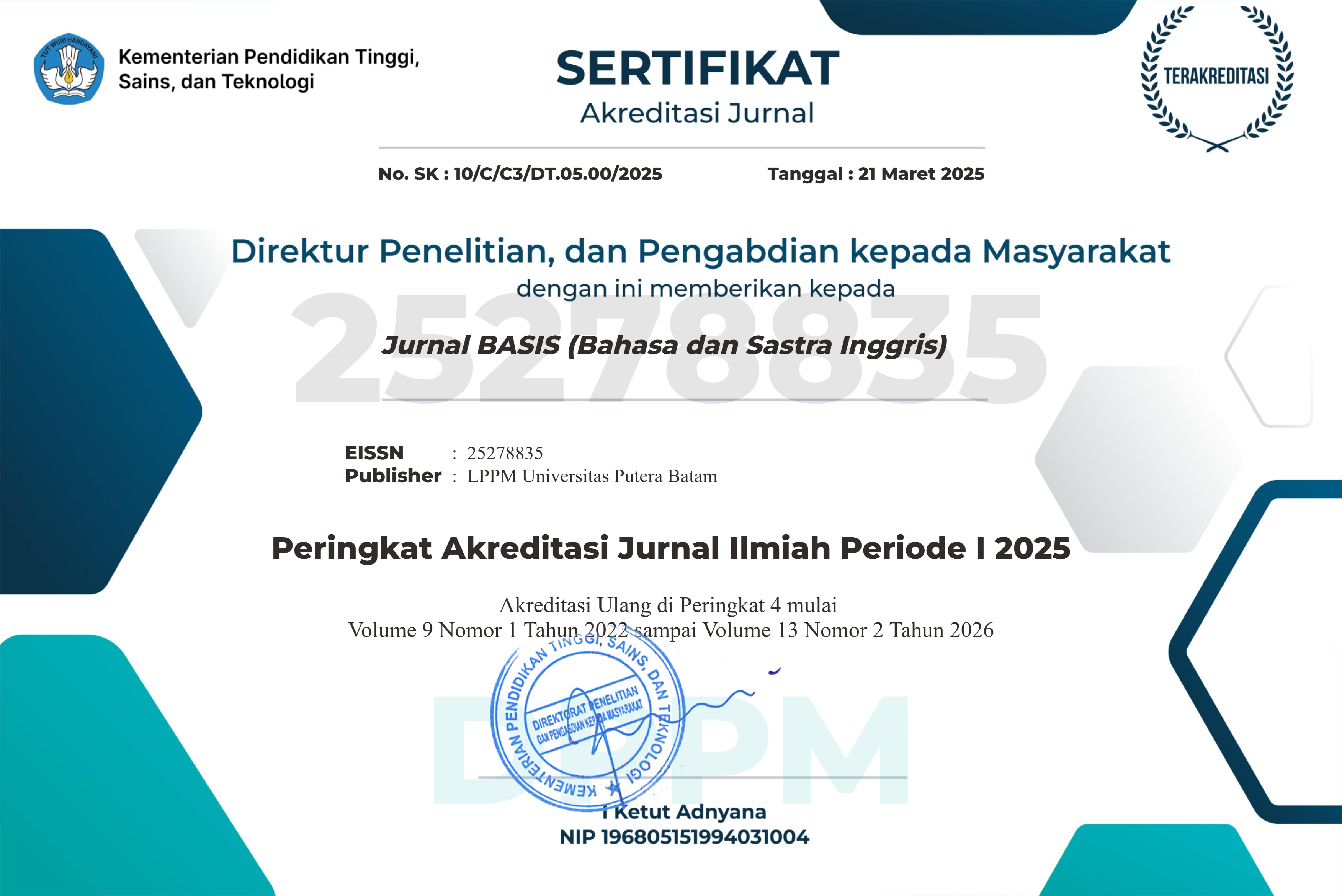THE RADICAL FEMINISM IN NO EXIT'S PLAY BY JEAN PAUL SARTRE
DOI:
https://doi.org/10.33884/basisupb.v10i1.7160Abstract
This study analyses the non-normative feminism performed by the characters in a play entitled No Exit by Jean Paul Sartre. The concept of feminism is linked to the liberation of women from the control and dominance of men. On the other hand, non-stereotypical principles are the development of individuals. In this non-normative discussion, the author relates it to the realm of feminism and lesbianism which is part of radical feminist theory. The objective of the study is to identify the tendency of non-normative of the characters named Inès, and Estelle in the play. This study is a literary criticism using qualitative descriptive method. The results of the study showed that the two main female characters show non-normative feminism attitudes, including having a sexual orientation that slightly deviate from French society at that time, not wanting to be in a relationship with men, and also not wanting to give birth and become a mother. As the title No Exit reminds us, Inès and Estelle exhibit their true identities only in a world closed to the rest of society; even in this space they are always reprimanded. Thus, Sartre criticizes the lack of options for non-stereotypical women in French society, as well as the tendency to view these women as inherently ‘immoral’.
References
Beauvoir, S. d. (1997). The Second Sex. United Kingdom: Vintage.
Dickinson, Torry D. (2003). Community and the World: Participating in Social Change. New York: Nova Science Publishers, Inc.
Duchen, C. (2003). Women's Rights and Women's Lives in France 1944-1968. United Kingdom: Taylor & Francis.
Junaidi, L. M. (2018). Stereotypes as the Ideology of Feminism in Novels Authorized by Indonesian Female Authors (Ideologicala Gynocritical Feminist Literary Criticism). International Journal of Linguistics, Literature and Culture, 4(1), 1–15. https://doi.org/10.21744/ijllc.v4i1.584
Levy, L. (2017). The Image and the Act: Sartre on Dramatic Theatre. The Philosophy of Theatre, Drama and Acting .
Lindburg, E. R. (2014). Feminist stereotypes: Communal vs. agentic. 47. http://scholarship.claremont.edu/scripps_theses/398
Moraga, C. (1948). La_Guera_-_Moraga.pdf.
Motta, S., Fominaya, C. F., Eschle, C., & Cox, L. (2011). Interface: a journal for and about social movements Feminism, women’s movements and women in movement. 3(2), 1–32.
Paludi, Michele A. (2010). Feminism and Women’s Rights Worldwide. California: ABCCLIO, LLC.
Sartre, J. P. (2010). No exit. Economist, 395(8679). https://ia800700.us.archive.org/11/items/NoExit/NoExit.pdf
Tabassum, N., & Nayak, B. S. (2021). Gender Stereotypes and Their Impact on Women’s Career
Progressions from a Managerial Perspective. IIM Kozhikode Society & Management Review. https://doi.org/10.1177/2277975220975513
Timmer, A. (2011). Toward an anti-stereotyping approach for the European court of human rights. Human Rights Law Review, 11(4), 707–738. https://doi.org/10.1093/hrlr/ngr036
Van Den Hoven, A. (2012). Sartre’s Conception Of Theater: Theory And Practice. Sartre Studies International, 18(2), 59–71. http://www.jstor.org/stable/42705197
Wall, M. (2013). Feminist theory, Lesbian parents, and social work. Sincronía, 63, 23–20.
Whelehan, I. (1995). 6 Crisis in Feminism?: Feminist Debates in the '80s and '90s. In Modern Feminist Thought: From the Second Wave to 'Post-Feminism' (pp. 125-146). Edinburgh: Edinburgh University Press. https://doi.org/10.1515/9780748632084-008
Wilany, E. (2017). Feminism Analysis in the Novel “Woman at Point Zero.” ANGLO-SAXON: Jurnal Ilmiah Program Studi Pendidikan Bahasa Inggris, 8(1), 115. https://doi.org/10.33373/anglo.v8i1.990













 JURNAL BASIS (BAHASA DAN SASTRA INGGRIS)
JURNAL BASIS (BAHASA DAN SASTRA INGGRIS)
